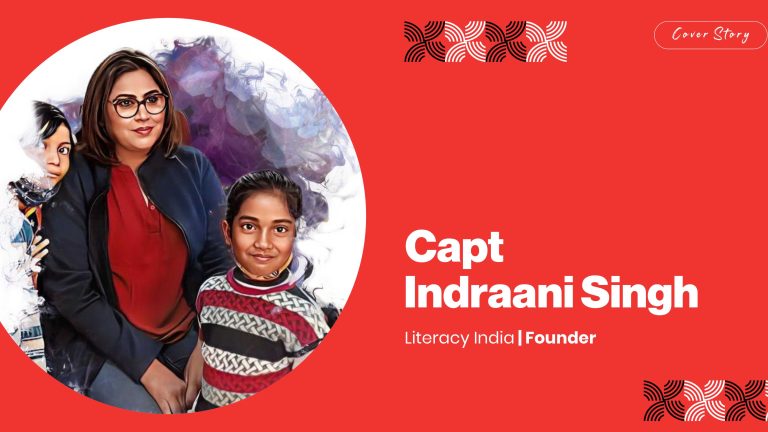Literacy India was founded in 1996 by Indraani Singh, driven by a deep passion for education and social justice. Since its inception, the organization has evolved into a widespread movement that touches the lives of millions of women, children, and youth from marginalized communities throughout India. The primary goal of the organization is to offer comprehensive solutions encompassing education, empowerment, employability, and environmental sustainability. Adapting to the evolving needs of its beneficiaries, Literacy India has introduced innovative programs like Smart Schools, Gyantantra, Future Skill Studies, Tinkering Labs, Village Level Entrepreneurship, and Project Indha.
Despite the challenges presented by the COVID-19 pandemic, Literacy India has persevered by transitioning its operations to digital platforms and engaging with communities effectively. With a reach exceeding 45 lakh individuals through various avenues such as education sessions, empowerment programs, volunteerism, corporate social responsibility, livelihood initiatives, skill development, higher education support, schooling projects, and collaborative efforts.
The vision of the organization is to forge a brighter and more inclusive future for the underprivileged communities it serves. Believing in equal access to quality education, economic opportunities, and a sustainable environment for all individuals. Literacy India aims to narrow the gap between privilege and disadvantage by empowering its beneficiaries to become self-sufficient contributors to society. The mission of the organization is centered on uplifting and transforming the lives of marginalized communities through holistic approaches that break down socio-economic barriers and foster meaningful progress.
In essence, Literacy India’s history, objectives, vision, and mission underscore its dedication to instigating positive change and empowering marginalized populations across India. Through a blend of innovative initiatives, inclusive strategies, and sustainable practices, the organization continues to advance toward a more equitable and promising future for all individuals involved.
A Journey of Passion and Purpose
Indraani Singh’s journey as a professional Aviator began with a passion for gliding and soared to the heights of the airline industry. Along the way, she earned many achievements and accolades, but she also felt a deeper calling – the urge to help others. Unlike some, who may hesitate or deliberate before taking up a cause, Indraani was naturally drawn to this kind of work. It seemed like helping people was part of her essence.
From then on, Indraani never looked back. Instead, she focused on constantly improving and expanding her efforts to support those in need. Over time, this drive went beyond individual assistance to making a difference for the nation as a whole.
Overcoming Obstacles in Rural Women’s Empowerment
As someone who works in rural areas, Indraani Singh witnessed the challenges that women face every day in their quest for empowerment. The development in rural belts is slow and uneven, with few livelihood opportunities for the poor. Moreover, factors like inflation and natural disasters hit the poorest of the poor hardest, with women and children suffering the most.
One of the main challenges is the lack of basic civic amenities. Many rural areas lack proper infrastructure, such as good roads and transport facilities. This makes it hard for the villagers, especially women, to access essential services and opportunities. Safety concerns also keep women from going out, whether for work or other purposes. Even simple tasks like going to the toilet can be risky, as they have to deal with unsafe surroundings. While some progress has been made in solving these problems, many villages still face these basic challenges, underlining the urgent need for holistic solutions to empower rural women.
Literacy India has encountered numerous challenges while working on women-centric projects in rural and semi-urban areas. In rural regions, obstacles like early marriages, lack of transportation for education, conservative backgrounds, domestic violence, and extreme poverty hinder progress. Cultural norms often lead to early marriages for girls, limiting their educational and career prospects. Additionally, limited access to transportation and infrastructure affects girls’ participation in education and training. Urban slums present challenges such as domestic violence, early marriages, poverty, malnutrition, and conservative attitudes towards women. Despite these hurdles, the organization remains dedicated to addressing the root causes of gender inequality and empowering women and girls to reach their full potential.
In addressing the lack of livelihood opportunities in rural areas, Literacy India, under the leadership of Captain Indraani Singh, initiated the promotion of school bags, uniforms, and woolens through the Indha project. This project not only provides these essential items but also offers extensive training to support these initiatives. The organization conducts surveys to identify the types of small businesses that rural women are interested in and assists them by providing capital to establish their own shops or home businesses. Indraani’s strategic approach aims to empower rural women by fostering entrepreneurship and economic independence through tailored support and training programs.
During the COVID-19 period, Literacy India, significantly increased employee engagement with beneficiaries through technology, providing motivation and a sense of well-being. Within the Karigari Project, tech-based financial literacy plays a crucial role. A special documentary named ‘Udaan’ has been developed in multiple languages to support women’s training across various grassroots skill programs. Captain Indraani Singh’s strategic focus on leveraging technology to enhance engagement and education underscores the organization’s commitment to empowering individuals through innovative approaches during challenging times.
Leveraging Technology for Empowerment
Literacy India has been working for over 27 years to meet the educational and skill development needs of rural and urban communities. The firm realized the power of technology to transform lives, and conducted a needs assessment to design customized training programs. Gyantantra, the organization’s innovative tech-based education platform, has reached 325,000 students in 2023. The company’s programs address specific challenges in sectors like agriculture and healthcare. In rural areas, technology improves livelihoods, while in urban settings, it prepares people for digital careers. Literacy India’s initiatives are in line with sustainable goals, using technology for positive change.
Indha Group, established in 2005, aimed to assist rural and urban slum women skilled in basic stitching and dressmaking but lacking market access. Market analysis revealed the need for reskilling to align with market demands, especially for products like block printing, handmade paper, and stationery. The UNSDG-2030 goals emphasized women’s empowerment, sustainability, poverty alleviation, and social enterprise entry into the market. Through the ICE model (Investing, Capacitating, and Enablement), Indha plans to create a secure business environment for rural and semi-urban artisans. Each product is crafted by a woman with a unique story, fostering a direct artisan-to-customer connection. Quality assurance spans from training to production, with an emphasis on upcycled or eco-friendly materials. Indha focuses on empowering women, preserving Indian crafts, and offering handmade products with ethnic flair and originality.
Showcasing Success Stories of Women Empowerment in Rural India
Gyantantra ( www.gyantantra.org) and Indha ( www.indha.in) are two initiatives that empower women through education and skill development. Gyantantra trains women teachers and enables them to become grassroots entrepreneurs, while Indha provides women with skill enhancement and reskilling opportunities to become proficient artisans.
Awards And Recognition
Captain Indraani Singh’s exceptional contributions have garnered her numerous accolades and recognition. She has been honored with prestigious awards such as the Godfrey Philip Special Award for Bravery in a Social Cause and inclusion in the Limca Book of Records. In recent years, she has been awarded the DMA All India Women Entrepreneurs Award 2021, the Women of Excellence Award 2021, and The Delhi City Icon Award 2021 for her community empowerment efforts. Furthermore, she received the High Fliers 50-Global Achievers Award in 2022, solidifying her reputation as a distinguished figure in her field.
Evaluating and Enhancing the CSR Policy of Indian Companies
Indraani Singh has seen some progress in the CSR policies of Indian companies, especially in the areas of women empowerment and sustainability goals like UNSDG2030. However, there is still a lot of scope for improvement. Many companies do not have dedicated CSR departments, and they handle CSR activities through their HR teams. She thinks having dedicated CSR teams with proper processes and budget allocation can improve their effectiveness and compliance with government regulations. Indraani also thinks the CSR and FCRA rules need to be clarified to make the implementation smoother. Indraani appreciates companies like Dell, MasterCard, Teleperformance, KPMG, and Deloitte for their impactful CSR efforts, and She thinks they should be recognized and awarded for their contributions. This can also inspire other companies to go beyond the 2% CSR rule and contribute more meaningfully to nation-building. She also urges the government to take more initiatives to promote clear guidelines and provide support, especially in remote areas where there is a lack of infrastructure, to encourage more CSR participation and impact.
Collaborating for Change
As an Aviator, Indraani Singh has learned to be adaptable and resilient in collaborating with corporations, government, and civil society. Just as she flies through the skies, she flies through challenges and opportunities, always looking for solutions. Positive encouragement from all the stakeholders gives her the motivation to go the extra mile and reach success.
Envisioning and Achieving a Brighter Future
Indraani Singh’s long-term vision for Literacy India is to keep improving and progressing in every step. Indraani Singh hopes to see Literacy India become even more progressive, promoting innovation and inclusivity in all initiatives. One of her specific goals for the future is to incorporate environmental conservation more into educational programs, enabling communities to adopt sustainable practices as part of their learning and daily lives. By giving importance to environmental education along with her existing efforts in empowerment and skill development, she aims to build a more holistic and resilient society for generations to come.
In Literacy India’s women-oriented projects, technology has been a pivotal element since its inception. The future skill programs see a significant involvement of young women, reflecting the commitment to digital empowerment for all women beneficiaries. Captain Indraani Singh’s strategic direction emphasizes leveraging technology to empower women and enhance their skills, aligning with the organization’s mission to advance digital literacy and opportunities for women in various programs
The process of using technology and online marketplaces for Karigari artisans is a work in progress. Artisan centers are being equipped with smartphones, and artisans are being trained on how to operate platforms like WhatsApp, Google Classroom, Google Duo, and Zoom. Classes have been held on these online platforms, teaching artisans how to use information on the internet to enhance their skills and access and sell finished products on e-marketplaces. Literacy India aims to forge ahead in this direction, understanding that digital agility is non-negotiable and working towards creating an environment where technology will provide width and depth, helping mainstream a million lives in the not-too-distant future.
Literacy India has introduced an innovative model called ‘Secure Borderless Workspaces’ that is independent of the student’s location. This model involves the use of a standard service delivery environment, cloud-enabled governance processes, heavy use of digital collaboration tools, and internal operations monitoring center. Students and teachers are now accustomed to working in this environment, where the centers across regions are connected through Skype and Microsoft team meetings. Going forward, a cloud-enabled governance process will also be developed to ensure that the internal system is made stronger.
Management: Capt. Indraani Singh, Founder
Website: https://literacyindia.org/






Add comment